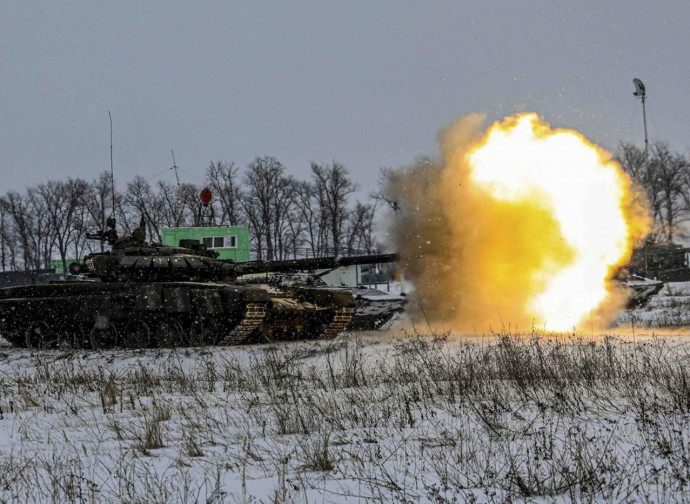Reasons why Russia won’t invade Ukraine
Despite the Biden administration, 17 American intelligence agencies and the Pentagon consistently raising the alarm, since last December, about an impending Russian invasion of Ukraine, the prospect that Vladimir Putin will really order a takeover of the former Soviet republic is remote if not political fiction.

Despite the Biden administration, 17 American intelligence agencies and the Pentagon consistently raising the alarm, since last December, about an impending Russian invasion of Ukraine, the prospect that Vladimir Putin will order a takeover of the former Soviet republic is highly remote if not political fiction.
US alarmism seems to be keeping in step with the ongoing rhythm of propaganda, and not without ridiculous results: last December Washington believed an attack in January was inevitable, then postponed it to February, then after the end of the Beijing Winter Olympics (a tribute by Putin to Xi Jinping), until a few days ago, when the same American intelligence sources revealed that Russian troops are now 70% ready to invade Ukraine. Yet, Moscow, which has never threatened to invade Ukraine, has no interest in moving its troops to Kiev or to other neighboring states. On the contrary, it has always strongly denied the hypothesis of invasion being pushed in the West. It is paradoxical to accuse the Russians of deploying 100,000 soldiers on their own territory or in nearby and allied Belarus for exercises when thousands of American and European soldiers are deployed (and more pouring in) in the Baltic Republics, Poland, Romania or Bulgaria. In addition, hundreds of US, British, Canadian and Polish military advisers are now siding with Kiev’s forces, which is not part of NATO but receives substantial military aid from the West.
The invasion of a European nation with 44 million inhabitants, of which a quarter hold dual Russian-Ukrainian citizenship, would have prohibitive financial costs, not to mention military losses and subsequent occupation costs. The Ukrainian population is perhaps the poorest in Europe and Moscow would have to take that responsibility on by occupying a nation lacking resources and which would have to be manned by hundreds of thousands of soldiers and policemen. For the Russians, it doesn’t compare to sending a few thousand soldiers and a few dozen planes and helicopters to Syria to help Bashar Assad.
The military and financial costs of the invasion and the prolonged occupation of Ukraine with the international sanctions that would be solicited by the US and NATO and the definitive blocking of gas exports to Europe are not compatible with Moscow's strategy or with its economic resources. The Russian GDP is equal to that of Spain and Moscow spends less than one seventh of the United States and one twelfth of the whole of NATO on defence. Nevertheless the Russians are asking for their needs related to the security of its western borders to be recognised.
Although the Anglo-Americans and all NATO member states have ruled out sending their soldiers to Ukraine in the event of a Russian invasion, just by comparing a 1990 map of Europe with one of today it’s evident that, since the fall of the USSR and since the dissolution of the Warsaw Pact, it was not the Russians who advanced towards the Rhine but NATO that has expanded east to the Russian borders, also threatening to incorporate two former Soviet nations such as Ukraine and Georgia. Such developments are unacceptable for Russia, which has been contesting American missile bases, in Poland and Romania for years, which should be defending Europe from the threat of Iranian ballistic missiles, instead of employing vertical launchers capable of firing cruise missiles which can reach Moscow in a few minutes.
Moscow, therefore, does not want war but, in the future, Ukraine’s possible membership of NATO or the deployment of American and Allied combat troops on Ukrainian soil would leave Russia with few alternatives.
In such an event, which would certainly not be in Europe's best interests, the Russians could evaluate an offensive extending to the Dnieper River, the natural border between Western and Eastern Ukraine, with the aim of obtaining a strategic stretch of land and which would move NATO a few hundred kilometers from Moscow (the Russian capital is 500 kilometres from the Ukrainian border).
Perhaps the most credible possibility of war, however, is the risk of an Ukrainian attack which, with the help of NATO, would try to recapture the rebel provinces of Donbass. Moscow's response would be inevitable, perhaps on a limited scale, and possibly not only limited to repelling Kiev’s troops aiming to conquer Mariupol, on the Sea of Azov, to achieve territorial continuity between the Donbass and the Crimea annexed by Russia in 2014.
It is unlikely, however, that the government of Kiev, where intolerance is mounting, for the way the pressure of Washington’s propaganda is fanning the crisis, and for which the Ukrainians will be the first to pay the price, will offer Moscow a pretext to expand Ukrainian territories into the hands of the pro-rebel Russians. A military development that would also undermine the NATO‘s residual military credibility and political stability, a veteran of the scorching defeat suffered against the Taliban in Afghanistan, humiliating even the EU, unable to cope with the serious crisis on its eastern borders.
